- Home
- Jodi Picoult
The Pact Page 3
The Pact Read online
Page 3
"She," Melanie answered, "is a hurricane."
MELANIE'S NEW JOB WAS as a staff librarian at the Bainbridge Public Library.
She had fallen in love with the tiny brick building the day she'd arrived for her interview, charmed by the stained-glass panel behind the reference desk, by the neat yellow piles of scrap paper waiting atop the card catalog, by the worn stone steps that decades of use had smoothed into curves, as if each one was smiling. It was a lovely library, but it needed her. The books were jammed pell-mell in the stacks, crushed against each other with no breathing or browsing room. The spines of some novels had cracked down the middle; the vertical file was littered with minutiae. Librarians, to Melanie, were somewhat on a par with God--who else could be bothered with, and better yet, know the answers to so many different types of questions? Knowledge was power, but a good librarian did not hoard the gift. She taught others how to find, where to look, how to see.
She had fallen in love with Michael because he stumped her. Michael had been a student at Tufts Veterinary School when he had come to her reference desk with two queries: Where he might find studies on liver damage in diabetic cats, and whether she'd like to have dinner. The first question she could have answered with her eyes closed. The second left her speechless. His neat, short hair, a prematurely bright silver, made her think of riches. His gentle hands, which could coax a newly hatched bird to drink from a dropper, made her aware of her body in entirely new ways.
Even after their marriage and during the first few years of his small-animal practice, Melanie had continued to work at the college. She advanced through the library system, figuring that if Michael woke up one day and decided not to love a stuttering wren of a girl, he might still be impressed by her mind. But Michael had gone to school to tend to cows and sheep, to breed horses, and after several years of neutering pedigreed puppies and giving rabies shots, he told Melanie he needed to make a change. The problem was, there weren't very many farm animals in a big city.
With Melanie's credentials, it had not been difficult for her to secure a position at the Bainbridge Public Library. However, Melanie was used to intense young men and women, to scholars bent into question marks over their texts, to kicking people out at closing time. At Bainbridge Library, the biggest draw was toddler story hour, because free coffee was served to the mothers. There were entire days when Melanie would sit at the reference desk and see only the mailman.
She longed for a reader, a true reader, like she was. And she found it in the unlikely form of Gus Harte.
Gus came unfailingly to the library on Tuesdays and Fridays. She would waddle through the narrow arched doorway, dumping off whatever books she'd borrowed days before. Melanie would carefully open them and match up the drawn cards and set them on the dolly to be reshelved.
Gus Harte read Dostoevsky, and Kundera, and Pope. She read George Eliot and Thackeray and histories of the world. Sometimes all in a matter of days. It amazed Melanie. And it terrified her. As a librarian, she was accustomed to being expert in her field--but she'd had to work at it. To Gus Harte, this sponging up of knowledge, like everything else, seemed to come too easily.
"I have to tell you," she said to Gus one Tuesday, "I think you're the only person in this town who appreciates the classics."
"I am," Gus said soberly. "I do."
"Did you like "Le Morte d'Arthur"?
Gus shook her head. "I didn't find what I was looking for."
And what was that? Melanie wondered. Absolution? Entertainment? A good cry?
As if Melanie had spoken aloud, Gus looked up shyly. "A name."
Inside, Melanie felt something snap with relief. Was it challenge she'd felt from someone like Gus, who devoured intricate historical novels as if they were pulp fiction? To find out that she was only skimming through, looking for something strong and classic to call her baby ... well, it should have depressed Melanie. But it didn't.
"What are you going to name yours?" Gus asked.
Melanie started. No one knew she was pregnant; she wasn't really showing yet and she was superstitious enough to leave it a mystery for as long as possible. "I don't know," she said slowly.
"Well, then," Gus announced brightly, "we're in the same boat."
MELANIE, WHO HAD BEEN too bookish in junior high school to have much of a social life, suddenly had a seventh-grade friend. Somehow, instead of Gus's exuberance overshadowing Melanie's reserve, they complemented each other. It was not unlike the mixture of oil and vinegar--neither of which one wanted alone on one's salad, but which together seemed such a natural twosome it was easy to believe they'd been made with each other in mind.
She would get calls from Gus first thing in the morning. "What's it like out?" Gus would ask, although the same weather was visible out her own window. "What should I wear?"
She would find herself sitting beside Gus on the big leather couch, looking at Gus's wedding album and laughing over the helmetlike hairstyles of her relatives. She would argue with Michael, and telephone Gus just to be told unequivocally that she was right.
Gus became comfortable enough to walk into the Gold household without knocking; Melanie borrowed baby-name books on interlibrary loan and left them in Gus's mailbox. Melanie started to wear Gus's maternity clothes; Gus bought Melanie's favorite brand of decaffeinated coffee to keep on hand; they grew able to finish each other's sentences.
"SO," MICHAEL SAID, accepting the gin and tonic that James Harte had mixed for him. "You're a surgeon."
James settled across from Michael in a wing chair. From the kitchen, he could hear Gus and Melanie, their voices high and sweet as robins'. "That I am," James said. "I'm finishing a fellowship over at Bainbridge Memorial. Ophthalmological surgery." He took a sip of his own drink. "Gus tells me you took over Howath's practice?"
Michael nodded. "He was one of my professors at Tufts," he explained. "When he wrote to say he was retiring up here, I started thinking there might be room for another vet." He laughed. "I couldn't find a Holstein within twenty miles of Boston, but I saw six just today."
The two men smiled uncomfortably and stared down at their glasses.
Michael glanced toward the women's voices. "They've hit it off," he said. "Gus is over so much, I sometimes think she's moved in."
James laughed. "Gus needed someone like Melanie. I have a feeling she gets more support complaining about stretch marks and swollen ankles to your wife than she gets from me."
Michael didn't say anything. Perhaps James was ambivalent about pregnancy, but Michael wanted as many details as he could get. He had taken books out of Melanie's library showing a blastosphere reconfiguring into a tiny human. He had been the one to sign up for natural childbirth classes. And as ashamed as Melanie was by her burgeoning body, he found it lovely. Pomegranate-ripe and lush, it was all he could do to refrain from laying hands on his wife whenever she breezed by him. But Melanie undressed in the dark, pulled the covers up to her chin, batted away his embrace. Michael had, from time to time, watched Gus move about his house--five months more pregnant and unwieldy, but with a confidence and a vigor that lit her from within, and he would think, This is how Melanie should be.
He looked toward the kitchen, caught a glimpse of Gus's swollen stomach preceding her. "Actually," Michael said slowly, "I kind of like this whole pregnancy thing."
James snorted. "Trust me," he said. "I did an obstetrics rotation. Messy business."
"I know," Michael said.
"Mmm. But pulling calves has to be different," James insisted. "A cow doesn't scream out that she's going to kill her husband for doing this to her. A cow's placenta doesn't shoot across the delivery room like a silver bullet."
"Ah," Gus said, suddenly there. "You're talking shop again." She put her hand on James's shoulder. "My doctor husband is downright terrified of childbirth," she teased, speaking to Michael. "Would you like to deliver my baby?"
"Sure," Michael grinned. "But I'm most comfortable operating in a barn."
Gus t
ook a cheese tray from Melanie's hands and set it down on the coffee table. "I'm flexible," she said.
Michael watched Gus settle on the arm of her husband's chair. James made no move to touch her. He leaned around her toward the cheese tray. "Is this the pate?" he asked.
Gus nodded. "Homemade," she explained. "James goes duck hunting."
"Really?" Michael said. He took a cracker and tried the spread.
"And deer hunting and bear hunting and once, sweet-little-rabbit hunting," Gus continued.
"As you can see," James said, unruffled, "Gus isn't a big fan of the sport." He looked up at Michael. "I guess you wouldn't be, either, as a vet. But there's a real beauty to it--you're up before the rest of the world, and it's absolutely quiet, and you're putting yourself into the mind of the prey."
"I see," Michael said, although he didn't.
"JAMES IS BEING AN IDIOT," Gus said one snowy afternoon when Melanie called. "He told me if I don't stop walking down Wood Hollow Road I'm going to have the baby under a telephone pole."
"I would think you'd have more time than that."
"Try telling him."
"Use a different tactic," Melanie said. "Tell him the better shape you're in before the baby is born, the easier it will be to get your old body back."
"Who said I want my old body back?" Gus asked. "Can't I pick someone else's? Farrah Fawcett ... Christie Brinkley ... " She sighed. "You don't know how lucky you are."
"Because I'm only five months pregnant?"
"Because you're married to Michael."
Melanie didn't answer for a moment. She liked James Harte, with his cool New England looks, his effortless charm, the thread of Boston accent in his speech. Many of the characteristics that Melanie possessed James possessed also, but with a positive twist: She was reserved, he was level-headed; she was shy, he was introspective; she was obsessive, he was exacting.
He was also right. Gus's water broke three days later, half a mile down Wood Hollow Road, and if a passing telephone company vehicle hadn't stopped to ask if she was all right, she might very well have delivered Christopher on the edge of the street.
THE DREAM WENT LIKE THIS: Melanie could see Michael's back as he crouched down in a stall, his silver hair glinting with the early sunlight, his hands moving over the heaving belly of a mare that was trying to foal. And she was standing overhead somewhere--in a hayloft, maybe?--water dripping down her legs as if she'd wet herself, yelling for him although no sound came out of her mouth.
That was how she knew she was going to have her baby alone.
"I'll call every hour on the hour," Michael assured her. But Melanie knew how Michael functioned: Once he got wrapped up in a colicky horse or a ewe with mastitis, time fell away for him; most of the roads he traveled as a country vet didn't have a luxurious string of telephone booths.
Her due date came and went at the end of April. Then one night, Melanie heard Michael answer the phone beside the bed. He whispered something her mind did not register, and disappeared in the dark.
She dreamed again about the barn, and woke up to find the mattress soaking wet.
Pain made her double over. Michael must have left a note somewhere with a telephone number. Melanie walked through the bedroom and the bathroom, periodically stopping to sweat out contractions, but she couldn't find it. She picked up the phone and called Gus.
"Now," she said, and Gus understood.
James was operating at the hospital, so Gus brought Chris along in his car seat. "We'll find Michael," she assured Melanie. She placed Melanie's hand on the gearshift, telling her to squeeze when it started to hurt. At the Emergency pavilion, she parked the car. "Stay here," she said, grabbing Chris and running through the sliding doors. "You have to help me," she shouted to a triage nurse. "There's a woman in labor."
The nurse blinked at her, at Chris. "Looks to me like you're too late," she said.
"It's not me," Gus said. "It's my friend. In the car."
Within minutes Melanie was in a delivery room, wearing a fresh johnny and writhing in pain. The obstetrics nurse turned to Gus. "I don't suppose you know where the father is?"
"On his way," Gus said, though this was not true. "I'm supposed to stand in for him."
The nurse looked at Melanie, who had reached out to hold Gus's hand, and at Chris, who was asleep in a plastic bassinet. "I'll take him to the nursery," she said. "Can't have a baby in delivery."
"I thought that was the point," Gus muttered, and Melanie choked out a laugh.
"You didn't tell me this hurt," Melanie said.
"Of course I did."
"You didn't tell me," she amended, "it hurt this much."
Melanie's doctor had also delivered Chris. "Let me guess," she said to Gus, reaching beneath the johnny to check Melanie's cervix. "You had so much fun the first time you couldn't stay away." She helped Melanie sit up. "Okay, Melanie," the doctor said. "I want you to push."
So with her best friend bracing her shoulders and shouting in strident harmony, Melanie gave birth to a girl. "Oh, my," she said, her eyes damp. "Oh, look at that."
"I know," Gus said, her throat tight. "I see." And she left to find her own child.
The nurse had just finished packing ice between Melanie's legs and drawing the covers up to her waist when Gus returned to the room with Chris in her arms. "Look who I ran into," she said, holding the door so that Michael could pass through.
"I told you so," Melanie chided, but she was already turning the baby so that Michael could see her.
Michael touched his daughter's fine blond eyebrows. His fingernail was larger than her nose. "She's perfect. She's ... " He shook his head and looked up. "I don't know what to say."
"You owe me," Gus suggested.
"I do," Michael said, smiling from the inside. "I'll give you anything but my firstborn."
The door of the room swung open again, and James Harte stood there in scrubs, holding aloft a bottle of champagne. "Hey!" he said, pumping Michael's hand. "Rumor has it that you've had quite a morning." He smiled at Gus. "And I hear you're a midwife." He popped open the Moet, apologizing as some fizzed onto Melanie's blankets, and poured the champagne into four plastic cups. "To parenthood," he said, lifting his glass. "To ... does she have a name?"
Michael looked at his wife. "Emily," she said.
"To Emily."
Michael lifted his glass. "And, belatedly, to Chris."
Melanie glanced at the baby's translucent eyelids and slack bow mouth, and reluctantly transferred her to the plastic bassinet beside the bed. Emily barely took up a third of the space.
"Do you mind?" Gus asked softly, pointing to the bassinet and then to Chris, snoring softly in her arms.
"Go right ahead." Melanie watched Gus lay her son beside Emily.
"Look at that," Michael said. "My daughter's an hour old and she's already sleeping with some guy."
They all looked at the bassinet. The baby startled, a reflex. Her long fingers flailed open like a morning glory and curled back into fists, grabbing for purchase. And although she was completely unaware, when Emily Gold again settled into sleep, she was holding tight to Christopher Harte's hand.
NOW
November 1997
There was very little that shocked Anne-Marie Marrone.
She would have thought that her ten years with the Washington, D.C., metropolitan police could offer more surprises than the subsequent ten years in the sleepy town of Bainbridge, New Hampshire, but she'd been mistaken. In D.C., she'd never known her perps. Somehow, domestic abuse was more unnerving when it came at the hands of the legendary, beloved Bainbridge Elementary School principal. A Mafia-run drug ring was less disturbing than a field of pot lovingly tended alongside the basil and marjoram at old Mrs. Inglenook's house. Finding a mortally wounded teenage girl, a bleeding boy, and a smoking gun might not have been a routine occurrence in Bainbridge, but that didn't mean Anne-Marie could not have seen it coming.
"I'd like to speak to Chris now," she repeated.
"You're wrong," Gus Harte said, folding her arms over her chest.
"Maybe your son can tell me that." She would not offer the mother the truth: that although she didn't yet have grounds to arrest Christopher Harte as a suspect in a homicide, the case would be treated as one until proven otherwise.
"I know my rights--" Gus began, but Anne-Marie held up her hand.
"So do I, Mrs. Harte. And if you'd like, I'd be happy to read them to you and your son. But he's not under suspicion now; he'd just be helping us put together an investigation. And since he's the only living eyewitness to what happened, I can't see why you'd object to my conversation with him. Unless," she said, "he's told you something you feel a need to hide?"
Gus Harte's cheeks burned; she stepped back and let the detective enter the hospital room.
ALTHOUGH THE WOMAN WASN'T wearing a uniform or visibly carrying anything more threatening than a notepad, there was a self-righteous scent about her that swept into the room with her arrival, causing James to rise and sidle closer to Chris's bed. "James," Gus said quietly, hoping that her son would sleep through it all, "Detective-Sergeant Marrone would like to speak to Chris."
"Well," James said, "as a doctor, I can tell you he's in no condition--"
"With all due respect, Dr. Harte," Detective Marrone said, "you aren't the attending physician. Dr. Coleman's already cleared my entry." She sat down on the edge of the bed and rested her notepad in her lap.
Gus watched this woman sit where she was supposed to be sitting and sensed a rising swell in her chest that reminded her of the way she'd felt years ago when a toddler had pushed Chris at the playground, or when Chris's fifth-grade teacher had intimated at a parent conference that he was less than perfect. The tigress, James had called her, when Gus went on the warpath to protect her child. But what, this time, was she protecting him from?
"Chris," the detective called softly. "Chris ... can I talk to you?"
Chris's eyes blinked open--bedroom eyes, Gus had always called them, so fathomlessly pale against his dark skin and hair. "I'm Detective Marrone, from the Bainbridge police."
"Detective," James said, "Chris has been through quite a trauma. I don't see what it is that can't wait."

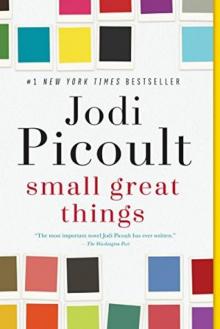 Small Great Things
Small Great Things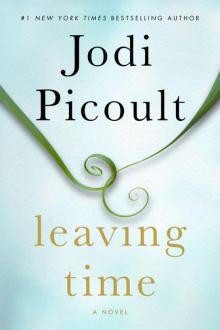 Leaving Time
Leaving Time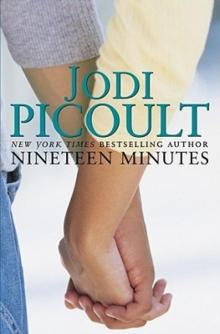 Nineteen Minutes
Nineteen Minutes Larger Than Life
Larger Than Life Perfect Match
Perfect Match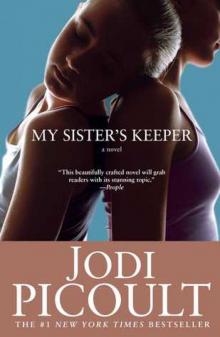 My Sister's Keeper
My Sister's Keeper The Pact
The Pact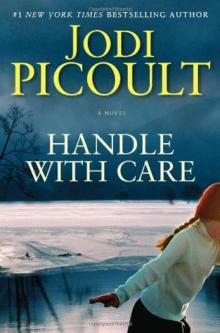 Handle With Care
Handle With Care Songs of the Humpback Whale
Songs of the Humpback Whale Mermaid
Mermaid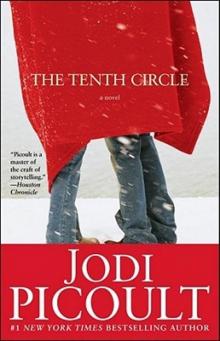 The Tenth Circle
The Tenth Circle The Color War
The Color War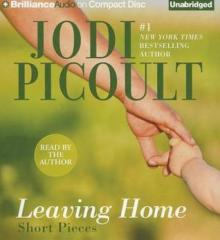 Leaving Home: Short Pieces
Leaving Home: Short Pieces House Rules
House Rules Lone Wolf
Lone Wolf The Storyteller
The Storyteller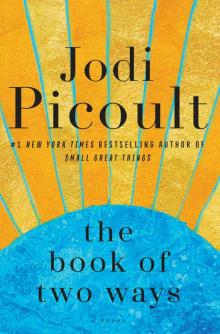 The Book of Two Ways
The Book of Two Ways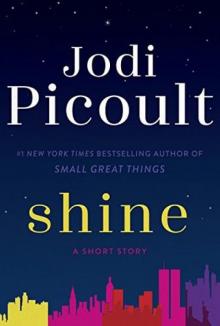 Shine
Shine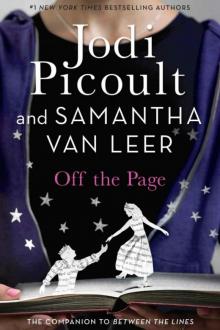 Off the Page
Off the Page Sing You Home
Sing You Home Second Glance: A Novel
Second Glance: A Novel Mercy
Mercy Vanishing Acts
Vanishing Acts Between the Lines
Between the Lines Plain Truth
Plain Truth Salem Falls
Salem Falls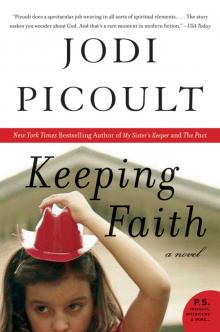 Keeping Faith
Keeping Faith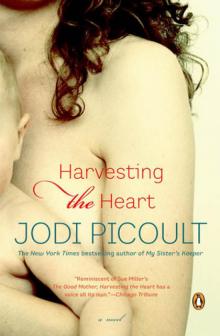 Harvesting the Heart
Harvesting the Heart Change of Heart
Change of Heart Where There's Smoke
Where There's Smoke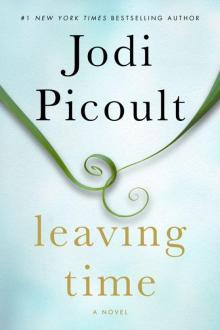 Leaving Time: A Novel
Leaving Time: A Novel Over the Moon
Over the Moon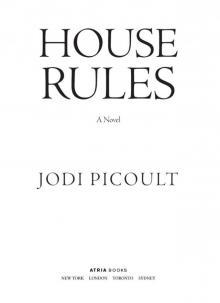 House Rules: A Novel
House Rules: A Novel The Jodi Picoult Collection #2
The Jodi Picoult Collection #2 Leaving Home: Short Pieces (Kindle Single)
Leaving Home: Short Pieces (Kindle Single)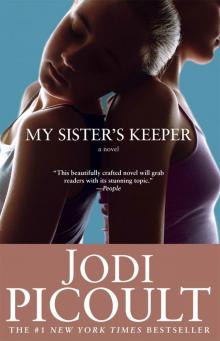 My Sister's Keeper: A Novel
My Sister's Keeper: A Novel![Mermaid [Kindle in Motion] (Kindle Single) Read online](http://i1.bookreadfree.com/i1/04/03/mermaid_kindle_in_motion_kindle_single_preview.jpg) Mermaid [Kindle in Motion] (Kindle Single)
Mermaid [Kindle in Motion] (Kindle Single) The Jodi Picoult Collection #4
The Jodi Picoult Collection #4 Sing You Home: A Novel
Sing You Home: A Novel The Jodi Picoult Collection
The Jodi Picoult Collection Lone Wolf A Novel
Lone Wolf A Novel Second Glance
Second Glance Larger Than Life (Novella)
Larger Than Life (Novella) The Jodi Picoult Collection #3
The Jodi Picoult Collection #3